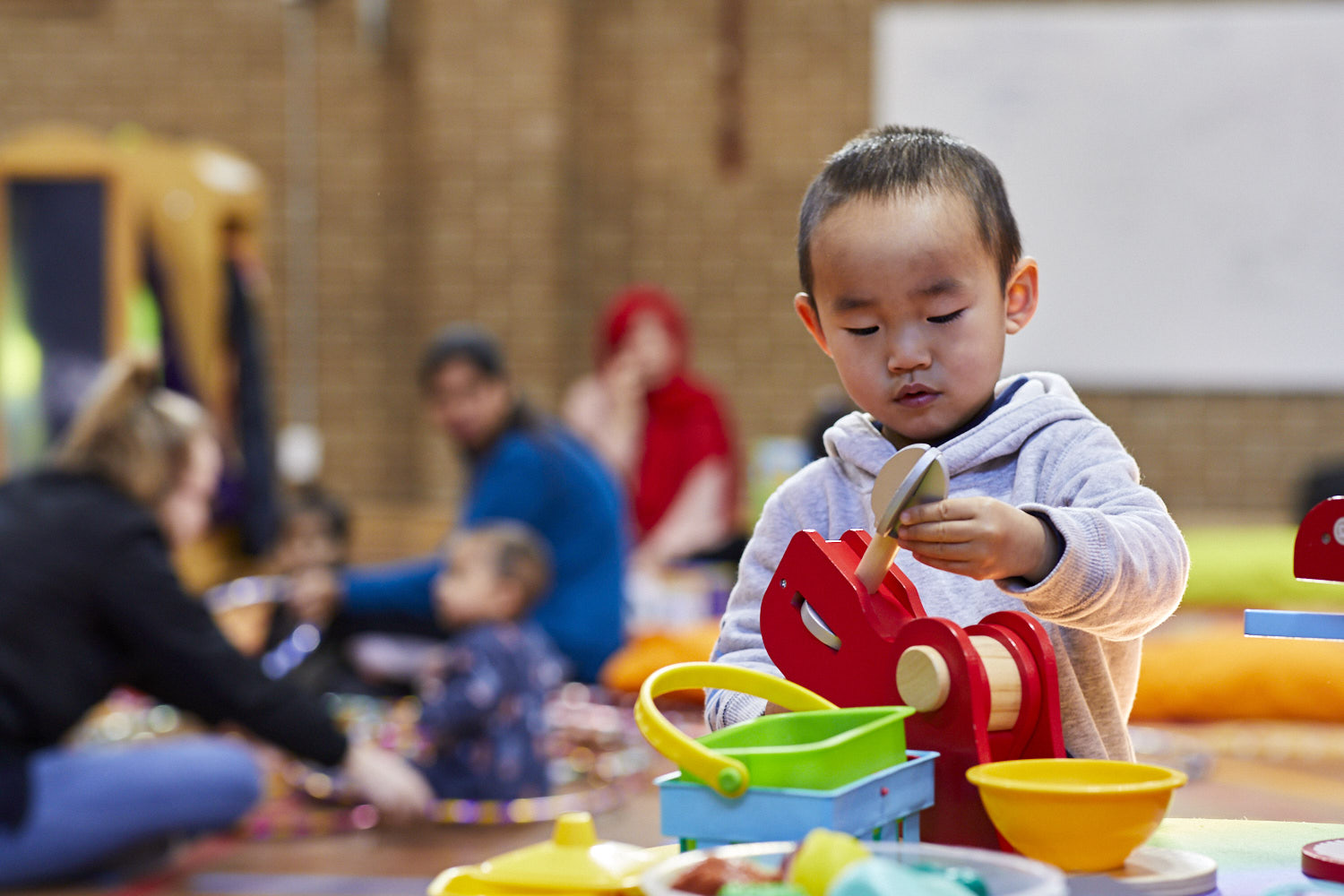On this page
Download this Fact Sheet:
Fact Sheet: Supporting learning through play (199.8 KB, PDF)
When should adults join in?
If a child is busy playing, you might observe to get to know how they play, what they’re good at and what they like doing.
Sometimes children will signal that they’d like you to be involved. Young babies who are just learning how to play might look at you as if they want to do something with you and be delighted when you engage with them. They communicate through their expressions and body movements.
Young babies who are just learning to play will communicate through their expressions and body movements. They might look at you, make noises, mimic behaviours and/or become delighted when you engage with them. They might also look away or reduce their responses when they are tired and need a break from the play.
Toddlers and older children will often let you know they want to play with you as well as when they want to play on their own again.
When a child appears to be observing others from a distance, it’s appropriate for you to invite them to join in or suggest an activity they might enjoy. This may be to learn a new game, listen to a story, sing a song or just to have fun.
Sometimes when children’s play isn’t working well, they may need some help, such as when they get frustrated with something they’re doing or when they’re learning and growing the skills to negotiate social situations.
How can educators support children’s play?
- play. They may ask for particular toys or books that relate to their current interests.
- Supporting children to find their play interests in the environment can help develop a child's sense of agency, choice and control. This helps support them to know they are valued and respected, which helps to further build their sense of self.
The best playthings encourage creative play and can involve many things. For example, bats and balls, drawing materials, blocks of varying sizes and shapes, nature play, dress-ups, dolls, puppets, sandpits, water and mud, things to push, pull and ride on, containers, playdough, musical instruments, and books.
You can help support learning and development through play with the following tips.
Providing safe spaces
- Arrange safe places for children to play, indoors and outdoors.
- Provide safe boundaries and limits on their play to ensure that it’s a positive experience for all.
Provide a time and a place
- Arrange time for play and make it a priority every day.
- Try to make it possible for children to finish play that they’re involved in before having to move on to do something else. If something else can’t wait, give children warning of the change.
Children often respond more positively when they are informed that a change is coming. It shows that their autonomy and agency are respected. This supports children’s ability to develop skills around resilience.
Provide options and activities
- Providing children with options to develop their skills, such as dolls, building blocks, playdough and paints.
- Allowing children to explore their natural environment, both inside and outside. For example, fabrics, boxes, leaves, gumnuts, puddles, pots and pans.
- Observing children’s play to give you more ideas of the things they may enjoy (their interests), as well as ideas that may support or extend their
Follow the child’s lead
Children need opportunities to play and work out feelings in their own way.
- Resist the temptation to criticise or direct play.
- Show support by being near, noticing and accepting how the child is playing rather than directing or taking the lead away from them. For example, saying “I see you’re singing your baby to sleep in the cradle” is supportive but saying “Now the baby is asleep – what do you think the mother will do next?” is directing and taking the lead away from the child.
Provide opportunities for children to play with others
Children benefit from playing on their own, with other children of varying ages and with adults. However, children can become overwhelmed and tired if:
- the environment is crowded
- their usual routine around rest and mealtimes are not respected
- there are few quiet spaces to retreat to
they are over or under-stimulated.
Offer guidance
Children value and benefit from the support of adults to learn to manage their feelings and social situations. This is essential social learning. You can help children to identify their feelings, know their feelings are understood, and help them learn to express and manage their feelings. This might be achieved by:
- being nearby to help a child feel safe, included and able to talk about how they feel
- providing encouragement to a child to get started or to feel comfortable enough to join in
- ensuring the play is inclusive – explore your understanding of inclusion and belonging by reading the Disability Inclusion Guide
- watching and commenting occasionally on what’s happening – which can help children develop communication skills and empathy.
Find out more about why play is important.
Be You Resources
Learn more about the benefits for educators to maintain positive and respectful relationships with families, communities and kin in Cultural responsiveness and First Nations perspectives.
Be You Professional Learning
Learn more about the benefits of children maintaining positive and respectful relationships with peers in the Connect module.
-
Bibliography
Rushton, S., Juola-Rushton, A., & Larkin, E. (2010). Neuroscience, play and early childhood education: Connections, implications and assessment. Early Childhood Education Journal, 37(5), 351-361. -
External links
Raising Children Network – Toddlers: play & learning / Preschoolers: play & learning / School age: play, media & technology
